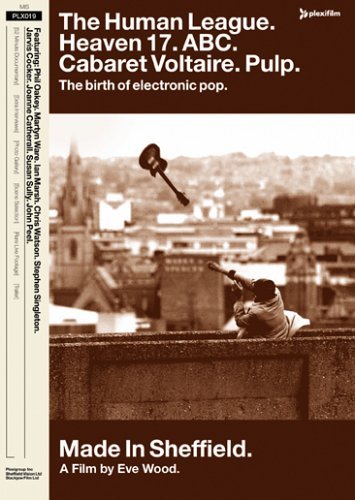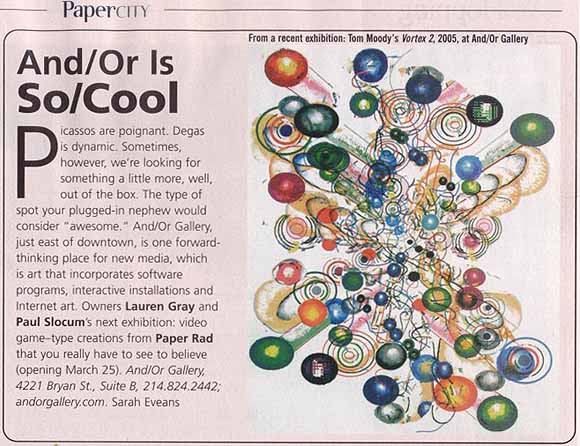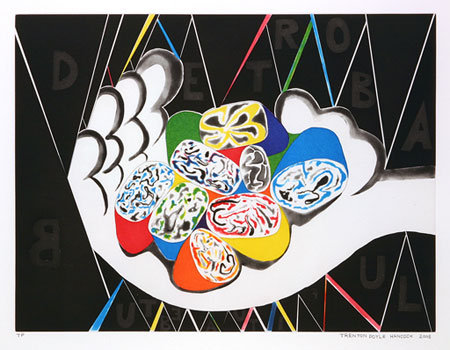View current page
...more recent posts

Thinking about buying this DVD. Looking at that picture makes me blissfully happy. I keep waiting and hoping that rock will die. That something will replace the three chords, the verse-verse-chorus, the drum-bass-lead, and the stupid iconic image of the slouching boy or girl clutching the ax as the ultimate avatar of coolness. The early '80s (documented in the film), and then again the early '90s, hinted that it was possible, but stupid cock rock cliches always come back, like the crabs. This blog page is dedicated not so much to the keyboard as an alternative, or even the "dj" (another kind of anti-authority authority figure), but rather abstract, orgiastic, authorless, soundcentric but still tuneful music, the unfulfilled promise of rave. House music, at the very least, with the dj/knob twiddler barely visible behind the record crates.
Now that that's out of the way, please note that Simon Reynolds discussed his book on postpunk last week on Slate.
More WhitCrit, this time from January Blog. I like blogs that talk about work. Yes, Midnight Dusters gets Elaine Sturtevant completely wrong, and mistakes Jutta Koether for Trisha Donnelly, but that's where commenters are helpful (they were right on top of it).
Wednesday I attended the less glamor more clamor, second, "artists'" opening of the Whitney Biennial. My first impression of the exhibition was that it was almost unbearably arch, clever, cold, soulless and ultimately depressing. I hated it. [No second impression is stated so this criticism will have to stand. --tm] The focus of the show seemed to be very much about "issues" that the art world seems to care about, not all of which are formal, but which seem to have little relevance in the world at large (witness Matthew Day Jackson's handmade, kitsch-owl commanded covered wagon with its bonnet of sewn-together state flags and undercarriage of rainbow colored fluorescent tubes). Not to be outdone, the worst work in the show was a series of large fake monoliths by Dan Colen. Giant (6 feet or so high by about the same in circumference) gray zoo-rocks covered in chewed gum wads and graffiti rest on 6" high wooden triangles carved to spell out "phrases from the street" like "eat shit and die." Everything about the objects themselves is overly precious and, like the art direction for West Side Story, completely removed from the physical reality of its ostensible subject matter.That's pretty tough, let's have some more:
Peter Doig's much anticipated paintings were shockingly old-fashioned. [Why shocking? They've always been old fashioned. --tm]
Less devastating is the continued presence of "rock art." Jennifer Allora and Guillermo Calzadilla's Sweat Glands is a large video projection of a lady rocker playing a guitar around a monolithic amp. Maybe it's a 2001 reference? Who cares?Trisha Donnelly, a performance/installation artist from San Francisco,Jutta Koether presents a big room with one panel of silver plastic curtain streamers [in] the middle of the room, a very large Marlene Dumas-ish ink on canvas of a naked woman on one wall, a silver Swiss Ball, perhaps a mirror ball? and a collection of shabbily-made flat-black wood panels with "abject teen" notes pinned to them. I wasn't present for one of the unscheduled performances, which are intended to "disrupt the temporal logic" of the exhibition.

MSPaintbrush in the news again...
It began in a lonely office cubicle in White Plains, NY...long weekends of overtime...a man had a vision that this lowly program could be used to make art...the vision spread...
Yeah, yeah, just BS'ing around. Thanks again to Paul and Lauren for making this show in Dallas happen and for making it so fun to do. I learned a lot working with them, and look forward to continuing collaborations and projects in cyberspace and elsewhere.
AFC sez, about the current Whitney Biennial:
It's hard to get past the feeling that rather than examining current trends, Biennial curators Chrissie Iles and Philippe Vergne began with a set of concerns they were interested in and then sought out artists who met those interests. There's nothing necessarily wrong with this, but it does strike me as an intensely egotistical practice to be making the claim that contemporary art making is about the things you happen to be interested in. Old school political activism is not the pulse of [the] nation.Hear, hear. No, I still haven't seen the show--take this for what it's worth as a preReview. An artist friend who had a frustrating studio visit from Vergne and Iles reports that they didn't look with their eyes, or even their ears, but with their mouths (especially him, and she deferred to him). And what is it with Europeans and the fucking spirit of '68? Catherine David took that same tack with Documenta a while back. Yes, a crazy liberating time for young Parisians, running wild in the streets, believing for a few moments in the possibility of universal socialism---GET OVER IT! I mean, Deep Dish TV? As much of their politics as I might agree with, what they do isn't art, it's political activist media. This is like Larry Rinder touching Rural Studio with the curatorial magic wand a few years ago and saying "I have the power to make you an artist." It's just not fair to people who do art 24/7 and deserve some comprehension. OK, I will shut up until I see the show. We're quibbling about the themes and the people, not the work.
Despite impressive resumes, having heard Iles and Vergne speak I find it hard to believe the curators had a real understanding of what inspired the work they managed to find. The most engaging art in the show often used recycled imagery, or constructed fictional narratives, and the curators forward increased travel as the explanation for this phenomenon. I guess artists with nominal pre-Whitney success are making a lot more money than I knew, because I just assumed travel was as much a credit risk to these people as it is to me.

Hadn't made it to Chelsea in a while and returned to find a universe of painting...and pain. The former I attribute to the hordes of well-heeled collectorbots descending on New York for the fairs and looking for "tangible product" (I know this is a frequent jab but there has to be someone we can make fun of). The latter I ascribe to our mass collective psychic residue of guilt over tearing another country to shreds with an elective, unprovoked war, combined with self-expressive narcissism as usual (the crucified Christ c'est moi).
Thus Giles Lyon channeling Steve Mumford's Baghdad Diary by way of Carroll Dunham (and Goya) at Mixed Greens; Michal Rovnar's punishing digital video at Pace recalling a fractal distillation of the oil field fires in Werner Herzog's Lessons of Darkness; bleeding bullet holes in Lucky DeBellevue's chenielle stem sculptures; Bonnie Collura's morphed figures that have grown increasingly gory and angst-ridden since she got raised to Olympian heights and then squashed like a bug by the Times (seriously, they were good, but might have done without the St. Sebastian arrows); Trenton Doyle Hancock's bone-through-the-wrist stigmata bleeding Pepto-Bismol; and that was just on two blocks.
Big shout-out to Jeff Elrod at Fredericks Freiser: punchy but elegant paintings; excellent addition of spray paint and grey check backgrounds a la Photoshop. Not Matisse with a Mac (as an old press release had it), so much as Cy Twombly. And kidding aside, that Trenton Doyle Hancock show at James Cohan (image above) is superb: a splattery gutfest with pitch-perfect balance of outsider-y collage elements and geometric tangles of bones and viscera. He takes pages from the Christian Schumann playbook, wads them up, spits on them, and glues them back on the canvas in a thousand pissed-off fragments. (Speaking metaphorically here.)
Updated: "Blues Vector" [3.6 MB .mp3]. The tune formerly called "Two Minute Drum Solo"--I thought it needed a slightly sylvan, deconstructed blues riff wafting in over the top, so I added that. "Vektor" is the preset on the Reaktor instrument Subharmonic used to play it. Changing the subject somewhat--finally learned how to make that "drill and bass" drum sound--it's just MIDI notes playing one sample many times in rapid succession--so now I don't need to do it any more.
"Blues Vector (Drums)" [mp3 removed]. What I originally posted.
I may change the title yet again: "Blues Vector" gets at what I am trying to accomplish with the piece but maybe is too ordinary, or pretentious.
Update: Reposted "Blues Vector" with volume maximized, 2009

"If you get excited by words such as analog and vintage, look away now. Oki Computer 2 is a compact wavetable synthesizer, a specialist in digital lo-fi sounds that hails back to the 8-bit era of beeps and bleeps... It is also rather capable of creating buzzing leads, rhythmic sequences, and odd tasty bass tones."
Brochure copy for a Reaktor Instrument designed by James Walker-Hall and Timothy Lamb, a kind of softsynth Sidstation with a more up-to-date sound. Music composed (mainly) using the Oki 2 can be heard on the Reaktions website. Some beautiful stuff here. This is the digital bleeding edge and the fact that it's commercial, licensed software is offset by the cultish climate of serious producers pushing each other in a critical environment of chatboards, non-commercial websites, etc. The music is very much a collaborative effort by individuals (artists, designers, preset crafters) trying to pull unique sounds out of that everyday, chip-laden plastic box sitting on your lap or under your desk. My favorite piece is "Progression 7819" by spr: one reviewer compares it to the Akira soundtrack, to which I would add it's doomy and Ryuichi Sakamoto-ish, with sputtering human beatbox-style (but still subtly digital) percussion. More on the abstract side but still lyrical are ZooTooK's Brian Enoid "Oki Compis 2," ElektrikZen's "Okiko," and Dongle Doc's "OKOK." I like the slowed-down psy-trance of Jason Wolford's "Systoric," and Damon Vallero's "Oki the Rainbow" has some nice chords reminiscent of Larry Heard sans the house thump. And lest this sound too much like a Native Instruments infomercial, I do find Oki (and Reaktor in general) more convincing as a flavor than a universe unto itself. On many of these pieces one yearns to hear some "bottom," something more "phat," not because the analog purist position is superior but because stronger pieces spring from contrasts and tensions.
This is from Matthew Barganier at antiwar.com. Quoted in its entirety because it's a great takedown of a pompous, war crime-enabling ass:
Andrew Sullivan's Song of HimselfAndrew Sullivan – for whom every topic is ultimately just another opportunity for navel-gazing – offers his mea sorta culpa. Let's have a mercifully abridged look:
In retrospect, neoconservatives (and I fully include myself [We know, Andrew, we know - Ed.]) made three huge errors. The first was to overestimate the competence of government, especially in very tricky areas like WMD intelligence. The shock of 9/11 provoked an overestimation of the risks we faced. And our fear forced errors into a deeply fallible system.
I was too trusting, too shocked, too afraid – too, in a word, human. Uh huh.When doubts were raised, they were far too swiftly dismissed.
Were raised? Did they just wash ashore at high tide, or were they raised by the very people Sullivan has been calling traitors and dupes for the past four years?[T]he miraculously peaceful end of the cold war lulled many of us into overconfidence about the inevitability of democratic change, and its ease. We got cocky. We should have known better. The second error was narcissism. America's power blinded many of us to the resentments that hegemony always provokes.
Ah, now we're getting somewhere. Could this be some sort of epiphany about empire and intervention? Get real:Sometimes the right thing to do will spawn backlash, and we should do it anyway. But that makes it all the more imperative that when we do go out on a limb, we get things right. In those instances, we need to make our margin of error as small as humanly possible. Too many in the Bush Administration, alas, did the opposite. They sent far too few troops, were reckless in postinvasion planning and turned a deaf ear to constructive criticism, even from within their own ranks.
Like from me, Andrew Sullivan! I always said we should get things right!The final error was not taking culture seriously enough. There is a large discrepancy between neoconservatism's skepticism of government's ability to change culture at home and its naivete when it comes to complex, tribal, sectarian cultures abroad.
I'll give Andy a congratulatory "duh" on that one.We have learned a tough lesson, and it has been a lot tougher for those tens of thousands of dead, innocent Iraqis and several thousand killed and injured American soldiers than for a few humiliated pundits.
But this self-effacing essay for Time magazine will help to even the score.The correct response to that is not more spin but a real sense of shame and sorrow that so many have died because of errors made by their superiors, and by writers like me.
First rule of neocon punditry: by taking meaningless "responsibility" for the bad consequences, you can logically take credit for the allegedly good ones. But you must first remind the audience that there was really no better choice than the one you advocated:All this is true, and it needs to be faced. But it is also true that we are where we are. And true that there was no easy alternative three years ago. You'd like Saddam still in power, with our sanctions starving millions while U.N. funds lined the pockets of crooks and criminals? At some point the wreckage that is and was Iraq would have had to be dealt with. If we hadn't invaded, at some point in the death spiral of Saddam's disintegrating Iraq, others would. It is also true that it is far too soon to know the ultimate outcome of our gamble.
Yeah, those goddamn French were probably just pissed at us because they wanted to invade Iraq, but we beat them to it. And this too-soon-to-know-the-ultimate-outcome bit is a moral monstrosity cloaked in banality. It's NOT too soon to know the ultimate outcome of "our gamble" (what did Sullivan put on the table?) for the scores of thousands already dead. What Sullivan is saying is that if the Iraqis ever manage to overcome the suffering inflicted on them by the War Party (including its years of supporting Saddam), then Sullivan will accept their humble thanks. Think I'm being too harsh? Well, here comes, as Andy might say, the money shot:What we do know is that for all our mistakes, free elections have been held in a largely Arab Muslim country. We know that the Kurds in the north enjoy freedoms and a nascent civil society that is a huge improvement on the past. We know that the culture of the marsh Arabs in the south is beginning to revive.
Blah, blah, blah. But, in conclusion, how does Andrew Sullivan feel about all of this?Regrets? [Cue Sinatra. - Ed.] Yes. But the certainty of some today that we have failed is as dubious as the callow triumphalism of yesterday. War is always, in the end, a matter of flexibility and will. And sometimes the darkest days are inevitable--even necessary--before the sky ultimately clears.
What a friggin' hack.
